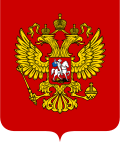Russian Empire
Russian Empire
The Russian Empire was a historical empire that extended across Eurasia and North America from 1721, following the end of the Great Northern War, until the Russian Revolution in 1917. It was the third largest empire in history, at its greatest extent stretching over three continents, Europe, Asia, and North America.
History[edit]
The Russian Empire was established on 22 October 1721 by Peter the Great after the Treaty of Nystad. Peter the Great's reforms brought considerable Western European cultural influences to Russia. The subsequent leaders continued this westernization, with policies that included the suppression of the Orthodox Church in favor of the Russian Orthodox Church.
The empire reached its peak of power during the reign of Catherine the Great when its borders expanded southward and westward to absorb New Russia, Belarus, and Right-Bank Ukraine. The empire extended into Central Asia, including the beginning of the conquest of the Kazakh Khanate.
Government and administration[edit]
The Russian Empire functioned as an absolute monarchy until the Revolution of 1905 and then became a de facto constitutional monarchy. The emperor served as both the head of state and all high ranking church positions. This system of government was instituted by Peter the Great.
Economy[edit]
The economy of the Russian Empire was a predominantly agrarian one with low productivity. Industrialization and economic modernization began to occur only from the 1860s onwards. The empire had a predominantly agricultural economy due to the vast tracts of fertile land, with wheat, barley, and rye being the principal crops.
Society[edit]
Society in the Russian Empire was multi-ethnic and multi-religion. The empire was dominated by the Russian ethnic group, but numerous other ethnic groups were included, such as the Ukrainians, Belarusians, Poles, and others. The state religion was Orthodox Christianity, but other religions were tolerated, including Islam, Buddhism, and Judaism.
Decline and fall[edit]
The decline of the Russian Empire is usually linked with the inefficient and autocratic political structure, corruption, and the peasant's life conditions. The empire began to decline in the late 19th century as it struggled to reform and modernize, and faced resistance from within the political establishment. The final blow was the Russian Revolution of 1917, which led to the abdication of Nicholas II, the last Emperor of Russia, and the creation of the Soviet Union.
| Russian Empire | ||||||||||
|---|---|---|---|---|---|---|---|---|---|---|
This Russian Empire related article is a stub.
|
| History of Russia |
|---|
|
|
| This article is a stub. You can help WikiMD by registering to expand it. |
Russian Empire gallery[edit]
-
Russian Empire (orthographic projection)
-
Russian Empire (1914)
-
Portrait de Pierre Ier (musée de l’Ermitage)
-
Coat of arms of Russia 1710s
-
The Victory at Poltava by Alexander Evstafyevich Kotzebue, 1862, Hermitage
-
Catherine II by J.B. Lampi (1780s, Kunsthistorisches Museum)
-
Rouble - Catherine II ММД
-
Измаил штурм
-
Russia 1771 Sestroretsk Rouble
Ad. Transform your life with W8MD's Budget GLP-1 injections from $75


W8MD offers a medical weight loss program to lose weight in Philadelphia. Our physician-supervised medical weight loss provides:
- Weight loss injections in NYC (generic and brand names):
- Zepbound / Mounjaro, Wegovy / Ozempic, Saxenda
- Most insurances accepted or discounted self-pay rates. We will obtain insurance prior authorizations if needed.
- Generic GLP1 weight loss injections from $75 for the starting dose.
- Also offer prescription weight loss medications including Phentermine, Qsymia, Diethylpropion, Contrave etc.
NYC weight loss doctor appointmentsNYC weight loss doctor appointments
Start your NYC weight loss journey today at our NYC medical weight loss and Philadelphia medical weight loss clinics.
- Call 718-946-5500 to lose weight in NYC or for medical weight loss in Philadelphia 215-676-2334.
- Tags:NYC medical weight loss, Philadelphia lose weight Zepbound NYC, Budget GLP1 weight loss injections, Wegovy Philadelphia, Wegovy NYC, Philadelphia medical weight loss, Brookly weight loss and Wegovy NYC
|
WikiMD's Wellness Encyclopedia |
| Let Food Be Thy Medicine Medicine Thy Food - Hippocrates |
Medical Disclaimer: WikiMD is not a substitute for professional medical advice. The information on WikiMD is provided as an information resource only, may be incorrect, outdated or misleading, and is not to be used or relied on for any diagnostic or treatment purposes. Please consult your health care provider before making any healthcare decisions or for guidance about a specific medical condition. WikiMD expressly disclaims responsibility, and shall have no liability, for any damages, loss, injury, or liability whatsoever suffered as a result of your reliance on the information contained in this site. By visiting this site you agree to the foregoing terms and conditions, which may from time to time be changed or supplemented by WikiMD. If you do not agree to the foregoing terms and conditions, you should not enter or use this site. See full disclaimer.
Credits:Most images are courtesy of Wikimedia commons, and templates, categories Wikipedia, licensed under CC BY SA or similar.
Translate this page: - East Asian
中文,
日本,
한국어,
South Asian
हिन्दी,
தமிழ்,
తెలుగు,
Urdu,
ಕನ್ನಡ,
Southeast Asian
Indonesian,
Vietnamese,
Thai,
မြန်မာဘာသာ,
বাংলা
European
español,
Deutsch,
français,
Greek,
português do Brasil,
polski,
română,
русский,
Nederlands,
norsk,
svenska,
suomi,
Italian
Middle Eastern & African
عربى,
Turkish,
Persian,
Hebrew,
Afrikaans,
isiZulu,
Kiswahili,
Other
Bulgarian,
Hungarian,
Czech,
Swedish,
മലയാളം,
मराठी,
ਪੰਜਾਬੀ,
ગુજરાતી,
Portuguese,
Ukrainian







